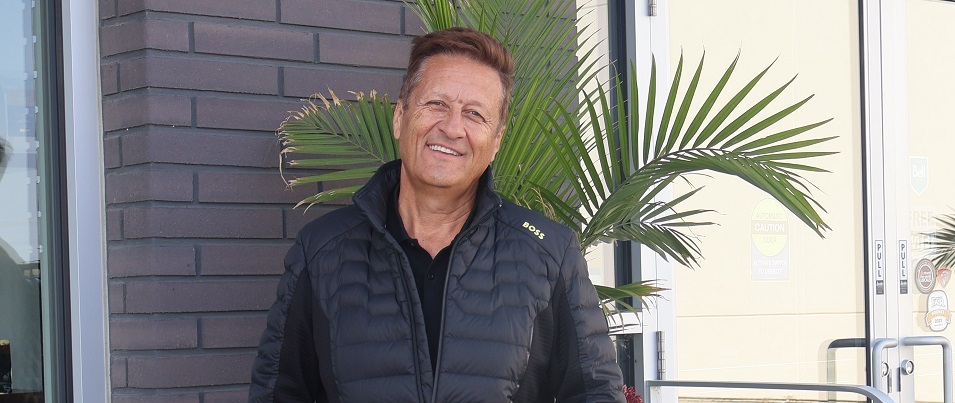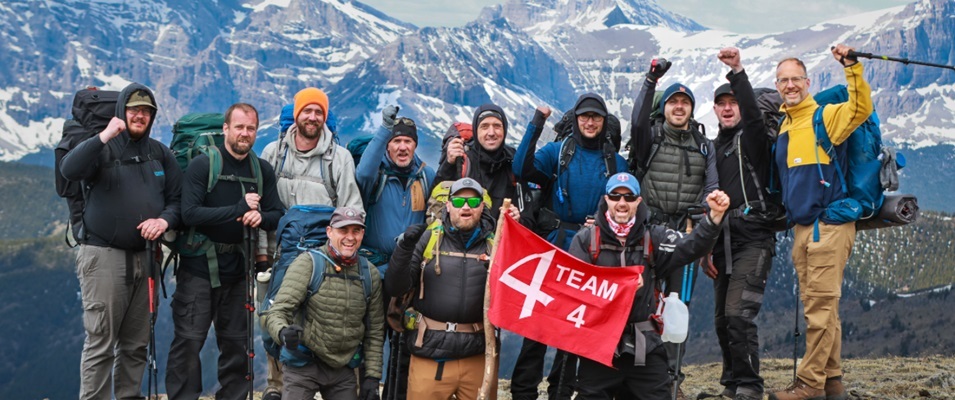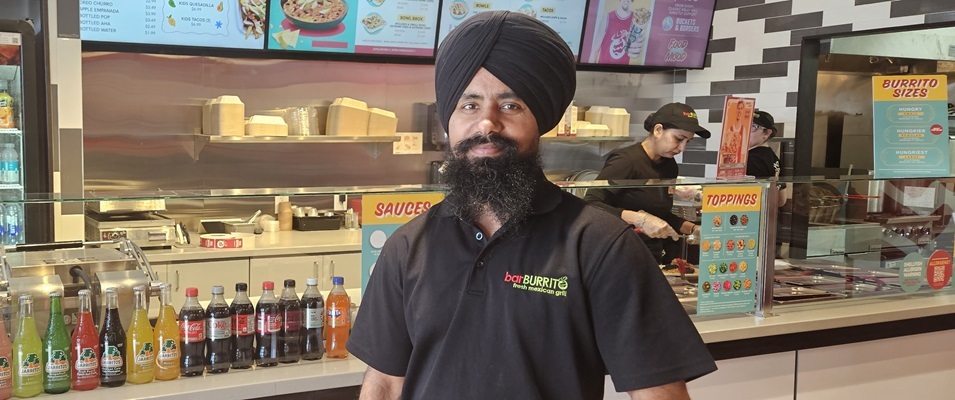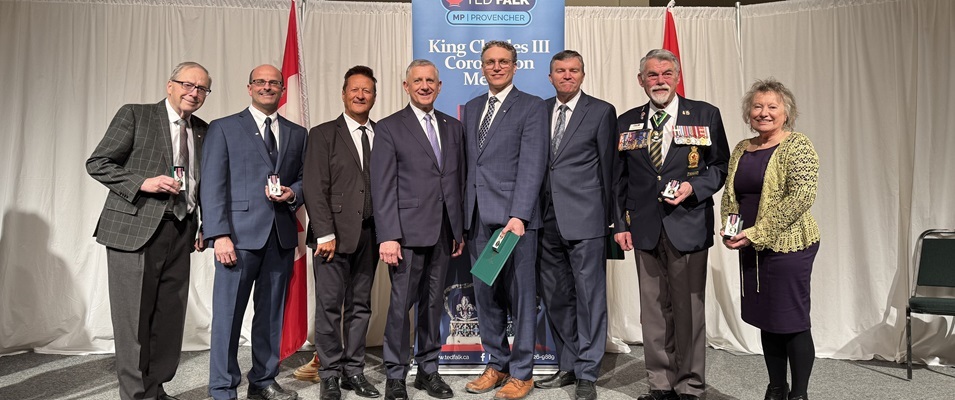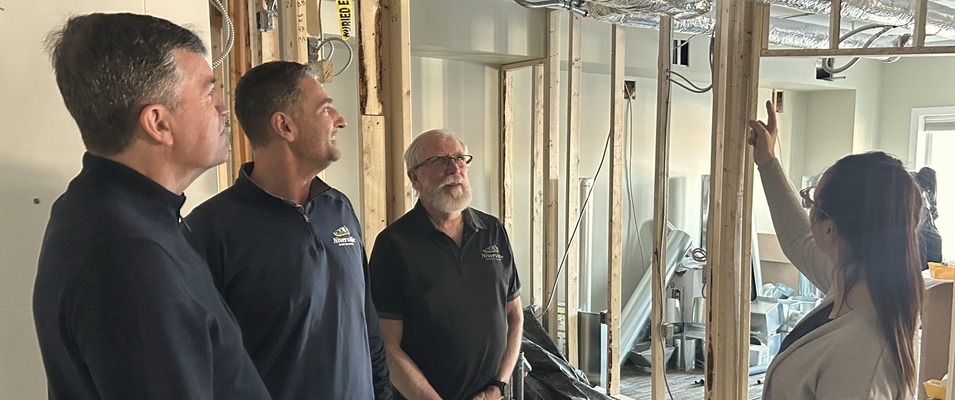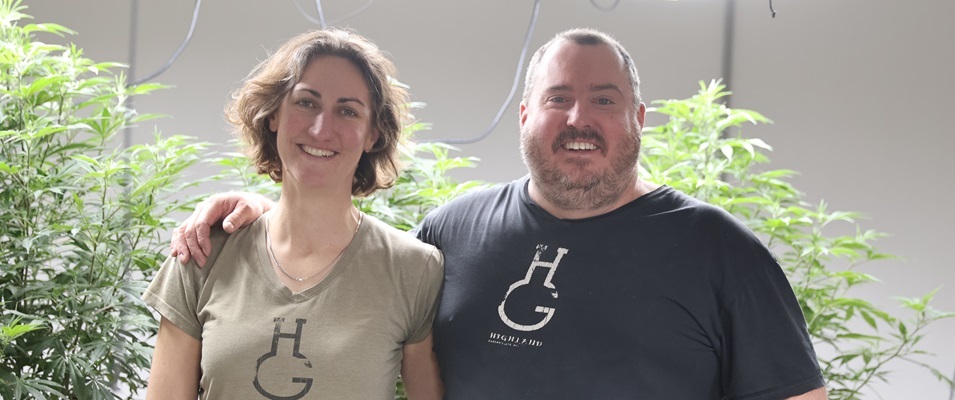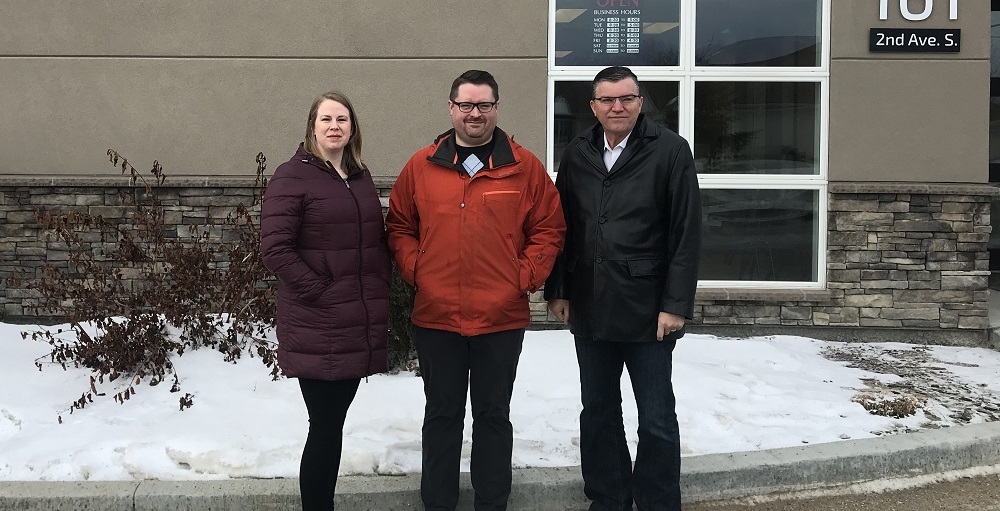
It’s been just better than two years since the Niverville Open Health medical clinic transitioned from being a privately owned to a publicly owned entity, and so far the situation is looking optimistic.
In a matter of 32 months, the clinic will have grown from two doctors to ten, following the early 2023return of one who’s currently on maternity leave.
As well, two nurse practitioners have joined the team and the reception staff now numbers six.
Perhaps one of the factors behind these successful staffing efforts is Open Health’s business manager, Kristen Fyfe, who was hired by the Town of Niverville in February 2020 as the new public model of clinic governance was being rolled out. Fyfe’s full-time role is to oversee the day-to-day operation of the clinic, to act as a liaison between the clinic and town council, and to provide an administrative presence with Niverville Healthcare Services Inc. (NHCSI), a not-for-profit oversight board.
NHCSI is also new as of 2020. Other members include town councillor Nathan Dueck, CAO Eric King, Dr. Lila Boroditsky, Dr. Ashley Britton, Dr. Chris Burnett, and Scott Wallace of the Niverville Chamber of Commerce.
“We have provided over 1,000 [new] patients… with a family doctor this year alone,” Fyfe says with pride. “We have served thousands of patients on a same-day basis who needed care, who either did not have a family provider, or who could not get in promptly with their family provider. The demand for appointments is very high, so this is something we look at all the time and hope to continue to expand these services as we are able.”
She adds that the additional physicians have also made it possible for the clinic to expand its hours this year to include Saturday morning same-day appointments.
“We know there is a large demand for same-day care and we are doing our best to fill in the gaps as we can,” Fyfe says. “Our team is our greatest success, though. We have a hard-working team of providers, nurses, allied health professionals, and staff.”
Success in the Face of Hardship
The successes already achieved by Open Health are impressive on their own merit. But when they’re viewed through the lens of all that’s happened in the last couple of years, it’s more remarkable still.
When the clinic transitioned away from the privately operated enterprise belonging to Drs. Chris and Mairi Burnett, it was in a weakened state.
In the fall of 2019, Dr. Mairi had been diagnosed with multiple myeloma, an incurable cancer of the plasma cells in her bone marrow. Between cancer symptoms and treatments that left her weak and at risk, she was faced with having to take an indefinite period of time off work.
The clinic’s only other full-time physician at the time, Dr. Chris, was attempting to juggle two full patient loads, care for his wife, and keep the clinic financially afloat on one income. The contract of the single physician assistant they employed at the time hadn’t been renewed.
Dr. Chris was stretched too thin. The future of the clinic was in imminent danger and the Burnetts’ dream of continuing to practice in their home community looked bleak.
In January 2020, Dr. Chris reached out to town council and Niverville Heritage Holdings board members to see if a solution could be found.
Recognizing the value that the clinic and the Burnetts brought to the community, council engaged the services of Kathy McPhail, former CEO of Southern Health-Sante Sud (SHSS).
McPhail was commissioned to put her 45 years of practical experience to use by performing a study on the sustainability of the clinic and exploring options under which it could be supported.
By mid-February, her report came back with a clear message: while there would be challenges, the clinic was viable in the long-term, given proper management and oversight.
Weeks later, the Burnetts became contracted physicians, and together with Fyfe and the newly organized NHCSI they forged ahead.
Two weeks in, the COVID-19 pandemic arrived.
Mayor Myron Dyck explains that the number of patients seeking care dropped off significantly as people became afraid of public spaces frequented by sick individuals.
“Clinic visits are what is billed to the province as per the established tariff rates,” Dyck says. “While video visits used to not be tariffed, the province changed that [during COVID]. However, those are at a lesser rate than in-person visits. So, in short, COVID has stunted the growth and clinic profitability. Hopefully next year, with additional doctors and no shutdowns, the clinic will see a profit, allowing council to begin to reinvest that profit back into healthcare in our community.”
The pandemic was also partly to blame for an extreme shortage of physicians as time went on.
“Doctor recruitment is complex, and when talking with many other clinics we have learned that we all face similar challenges when it comes to recruitment, especially in a rural setting,” says Fyfe. “Statistics from Doctors Manitoba can be found online. I believe Manitoba has the lowest number of doctors per capita in Canada.”
A Look at the Finances
In preparation for what council and NHCSI had known would be a difficult first year, the 2020 budget was created with the expectation of a provisional grant from the town of $148,000 to get the floundering clinic back on its feet.
If things proceeded as hoped, the grant would allow for a break-even year. Instead, just $120,000 was needed and the result was an end-of-year surplus of almost $50,000.
In 2021, the amount of the town grant dropped to half as much: $65,000. That year closed with a $19,000 surplus.
Year three hasn’t yet been audited, but CAO Eric King anticipates that the required grant will be cut almost in half again, landing somewhere between $35,000 and $40,000. By end of 2023, King feels fairly confident that the clinic will be fully self-sustaining.
The goal, eventually, is to reach a place where the clinic is fully staffed, has longer hours of operation, and offers even more services such as a full lab and diagnostics.
Even before that goal is met, though, Councillor Nathan Dueck envisions a clinic that will experience a growing profit margin that can be reinvested right back into the facility.
“This way, the money that’s made at the clinic stays in the community, so that in the future we can start adding diagnostics and other things if there’s adequate evidence of a return on the investment,” Dueck says.
In the meantime, Kings says the seed money provided to Open Health to date is technically a repayable grant, with the expectation that the town can request repayment when the clinic finds itself in a profitable position down the road.
Clinic Revenue
Revenue generated by Open Health comes from a variety of sources. First and foremost is the doctor-generated revenue. The ten doctors working out of Open Health work on a fee-for-service model.
“What this means is when a patient visit is billed to Manitoba Health, the doctor is paid and the clinic retains a percentage of those billings,” Fyfe says.
To help rural clinics acquire and maintain physicians, the province offers doctors an additional five percent rural billing bonus if they are willing to work outside of Winnipeg’s city limits.
In order to further encourage doctor recruitment, the contract between Open Health and its doctors amounts to a competitive 80/20 split, with the clinic keeping 20 percent to cover overhead costs such as administrative salaries, rent paid to the Heritage Centre for use of the building, the cost of medical supplies, etc.
Another source of clinic revenue comes from SHSS, which provides some financial investment towards reception staff whom they share with Open Health.
“This collaborative model allows our clinic to have a centralized reception area to direct patients and allow all of the providers, nurses, and allied health staff to work in collaboration in a team environment,” says Fyfe.
Like Open Health, SHSS rents a portion of the clinic space from the Heritage Centre so that they can provide a range of additional clinical staff to complement the office’s services. These include nurse practitioners, primary health and mental health workers, a chronic disease team, public health staff, and child and youth workers.
Slow and Steady Growth
Since taking time off to manage her cancer, Dr. Mairi has returned to the clinic on a part-time basis. The other nine doctors on staff are a mix, some working full-time and others working part-time.
Some of the part-time physicians working from Niverville also work in Winnipeg at personal care homes or other privately run clinics.
Fyfe says that at the time of the clinic’s restructuring in 2020, a five-year plan was created to help the team focus on their physician end goal.
“The clinic requires six full-time equivalent doctors consistently to remain profitable,” says Fyfe. “So it is important to note that even with 10 to 11 doctors, that may not equate to six full-time positions, and we are actively working on this goal.”
At present, and with its current staffing levels, Open Health is operating at 4.8 full-time equivalent positions.
While six full-time equivalent doctors is all that’s needed to balance the books, growing patient demand in the region means that there’s potential for even more doctors to successfully practice out of Open Health.
At some point, space in the facility could become an issue. Therefore, NHCSI has made it a goal to expand clinic hours for now. Running split-shifts into the evenings and weekends maximizes the use of the clinic space and provides increased accessibility for all patients.
Fyfe also anticipates a time in the not-too-distant future when the clinic’s services will expand to include a full range of diagnostic services.
“This is something the board discusses on an ongoing basis because we see this as a big need for the community and surrounding areas,” Fyfe says. “There is no set plan currently about specific diagnostics coming to the clinic yet, but we have been looking at the need for EKG, ultrasound, and X-ray.”
Ongoing Recruitment Strategies
Fyfe says that NHCSI is employing a number of strategies to promote Open Health to new physicians. For starters, they reach out to local universities on an ongoing basis to garner the interest of graduating doctors.
“Many recruitment events went virtual in the last couple of years, making those types of recruitment connections more difficult,” Fyfe says. “We are now seeing the resurgence of in-person events, which we hope to attend in the future in order to make those connections.”
And while the acquisition of physicians is important, Fyfe says that NHCSI’s emphasis will more heavily focus on doctor retention.
“Doctors Manitoba released data noting that, in Manitoba as a whole, 43 percent of doctors planned to retire, leave the province, or reduce their practice hours in the next three years,” says Fyfe. “We want our providers to have successful and long careers with an emphasis on work-life balance.”
Councillor Dueck says that one of the best ways to attract doctors is to be a clinic that’s bursting with client potential, which this region is. As well, providing a clinic that’s as well-rounded and outfitted as Open Health should prove to be a boon.
“What we’re realizing is that doctors are happy working in rural Manitoba as long as the tools that they need are provided to them,” Dueck says.
Another appeal of working at Open Health, says Dueck, is the positive working environment with an equitable pay structure.
And when the clinic finally expands to provide diagnostic services, Dueck says this will give physicians just one more reason to come—and to stay.
This may mean further town investment down the road, though.
“I’m not against investing more money from the community into healthcare if necessary, as long as there’s a method of payback to it,” Dueck says. “I take a look at other communities around the area that are potentially putting in $100,000 to $200,000 per year into just trying to retain two doctors. We’re not in that situation. We have doctors.”
For Fyfe, looking back at the challenging xperiences of the past two and a half years is just as important as looking into the future.
“Not enough can be said for what the Burnetts have done over the years, building up the clinic, and the foresight they had to save it from closing,” Fyfe reflects. “Had they not approached the town to present this idea, the clinic would have closed. At the time of restructuring, there was a goal of a four- to five-year turnaround to break-even/profitability and we are right on target for that, with this being possible even a year earlier than expected.”






